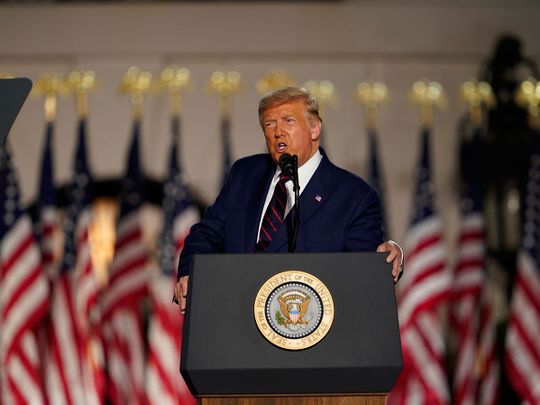
Cairo: While US President Donald Trump has sought to minimise long American involvement in the Middle East, he has ironically ended up involving deeper in reshaping the turbulent region. Over the past four years, the Republican president has forged a solid alliance with the Gulf countries. Symbolically, Trump’s first foreign trip after becoming president was to Saudi Arabia in May 2017.
The Gulf countries, including the kingdom, openly supported Trump’s maximalist approach towards Iran after he withdrew the US from an international nuclear deal that the administration of his Democratic predecessor Barack Obama signed in 2015. The Gulf countries were displeased with the Iran deal, seeing it as too lenient to put the brakes on Tehran’s nuclear programme and its meddlesome behaviour.
Trump reimposed severe sanctions on Iran and ordered the killing of top Iranian general Qassim Sulaimani in Iraq earlier this year amid high tensions between Tehran and Washington.
Peace treaties
Trump has also transformed the Middle East by engineering normalisation of ties between several Arab countries and their historic foe Israel. Last month, the UAE and Bahrain on the one hand and Israel signed landmark peace treaties in the White House. Building on the momentum, Trump announced last week that Sudan and Israel agreed to normalise their ties and hinted that other Arab countries are set to follow lawsuit.
This legacy would be at stake should Trump lose his bid for a second term to his Democratic rival Joe Biden, who served as Obama’s deputy, regional experts say.
“Of course, it is in our interest that Trump wins because his orientations are known and serve our interests,” said Saudi journalist Mohammed Al sheikh. “His stances against the Mullah Republic [in Iran] are unequivocal and firm,” he wrote in the Saudi newspaper Al Jazeera.
However, Al Sheikh believes that Biden’s win will not be a catastrophe for the Arabs. “Many specialists in US affairs are of the opinion that Biden is not a copy of Obama, but more moderate than him. Besides, he [Biden] does not bear hatred to the Arabs as Obama did,” Al Sheikh said. “Therefore, I think that Biden’s win will not be that bad or catastrophic as the doomed Obama era was as enemies of Arab moderation countries wish.”
Moderate Arab countries such as Saudi Arabia are regional heavyweights that no US president can overlook, according to Al Sheikh. “What the Democrats disliked in the past is no longer the case today, especially as most moderation countries’ shift towards peace and normalisation with Israel has reshaped the region so much that Biden cannot ignore it if elected. At the same time, the Iranian acts against the Americans in Iraq cannot be ignored either by the new president,” he added, referring to a string of attacks recently targeting US troops in Iraq that have been blamed on Iranian-backed militias there.
Regional stability
Several officials in the Trump administration have repeatedly branded Iran as the world’s prime sponsor of terrorism, citing its proxies in the Middle East as threats to regional stability.
While arguing that foreign policy is not traditionally a crucial factor in the US presidential election, Egyptian analyst Ahmed Sayed Ahmed said that Trump would make use of his pro-Israel moves and recent normalisation pacts to canvass voters mainly Israel’s supporters.
“He is also using his uncompressing policy towards the Iranian regime and his maximalist approach against Tehran over its support of terrorism and development of a nuclear and missile programme,” added Ahmed, the expert at the Cairo-based Al Ahram Centre for Strategic Studies.
“If Trump wins, which is most likely, this will be due to Biden’s weakness and his failure to come up with a strong election platform to provide a convincing alternative for Trump,” he said.
Another feather in Trump’s mantle is his firm stance against the Muslim Brotherhood, banned in several Arab countries, including the UAE, Saudi Arabia and Egypt.
“The Arabs cannot forget the strong alliance between the Obama administration and the Brotherhood,” said Salah Al Hadi, an Egyptian analyst. “That administration openly supported the so-called Arab Spring revolutions that have resulted in the bloody collapse of several Arab states. Trump has taken a totally different course that has diminished the Brotherhood influence and sought to serve American interests by strengthening US ties with the major Arab countries,” Al Hadi added.
“If Biden won, he might renegotiate the nuclear agreement with Iran, but he is unlikely to turn his back on America’s weighty allies in the region,” he said. “If not, he would put the US interests in the region at risk and strengthen militants’ hands.”








